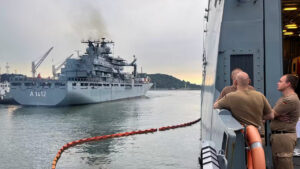THE PHILIPPINES and Germany are looking to sign a defense agreement outlining areas of security cooperation by the end of the year, according to Germany’s Ambassador to Manila.
On the sidelines of the German-Philippine Chamber of Commerce and Industry briefing on Tuesday, Ambassador Andreas Michael Pfaffernoschke said that the two parties are still negotiating the terms of the agreement.
“I think it’s a general agreement on how to work together on security issues in the future,” Mr. Pfaffernoschke told reporters late Tuesday.
“The real content is still subject to negotiation, but it will include training like it’s already done for the Philippine Armed Forces in Germany; it might include equipment; and it will include joint exercises and many more,” he added.
He described the agreement’s scope would not reach the level of a Visiting Forces Agreement (VFA).
“It’s a Security Cooperation Agreement. I don’t think there’s an interest, neither of Philippine troops to be stationed in Germany nor of German troops to be stationed in the Philippines in the future. So we do not aim for a VFA but for something lower,” he added.
He said there is a working draft for the agreement, subject to further negotiation.
“For this agreement, Defense Secretary Gilberto C. Teodoro, Jr. and my Defense Minister in principle had agreed to (conduct negotiations until) the end of this year,” he said.
“But you know, once you have agreed on a text, there are still the legal checking procedures in the ministries, and that might again take time. So, I’m still hopeful that we will get there by the end of the year,” he added.
Asked for his outlook on trade and investment between the two countries, he said it will depend on whether the Philippines undertakes measures that are attractive to foreign direct investment (FDI) and removes any obstacles.
“If so, then I have every reason to advertise for more FDI to come to the Philippines. But it also depends on the government, and it is hard to predict what will come out of that,” he said.
He said that German companies have continuing interest in the Philippine business process outsourcing, automotive, pharmaceutical, semiconductor, and logistics industries.
“But I could expect others, like insurance and banking companies, to also come to the Philippines,” he said.
“I think slowly but steadily (they will come in); we just have to continue advocating for the Philippines,” he added. — Justine Irish D. Tabile
